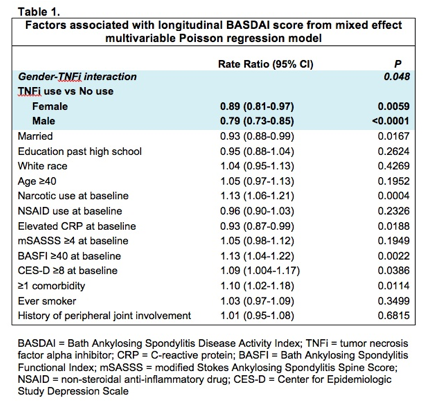Session Information
Date: Monday, November 9, 2015
Title: Spondylarthropathies and Psoriatic Arthritis - Comorbidities and Treatment Poster II
Session Type: ACR Poster Session B
Session Time: 9:00AM-11:00AM
Background/Purpose:
Ankylosing
spondylitis (AS) manifests differently in men and women. Women with AS have
less severe radiographic disease, yet tend to report more severe symptoms. Little
is known about the relationship between gender and disease activity in response
to tumor necrosis factor alpha inhibitors (TNFi) in AS. The objective of this
study was to explore the longitudinal relationship between gender, TNFi use,
and disease activity among patients with AS.
Methods:
In this
prospective multicenter cohort study, 659 participants meeting the modified New
York criteria were recruited from 2003-2015 and followed every 6 months. Data
collection included: demographics, medication history at each visit,
comorbidities, depression scales, erythrocyte sedimentation rate (ESR), C-reactive
protein (CRP), and disease activity, measured by the Bath Ankylosing
Spondylitis Disease Activity Index (BASDAI). Univariable logistic regression
models were performed to identify potential confounders associated with both gender
and BASDAI, and these were incorporated into a longitudinal multivariable mixed
effect Poisson regression model using BASDAI as the dependent variable (Table
1). Possible interaction effects were also evaluated while developing the final
model.
Results:
Participants
were 73.3% men and 79.1% white, with mean age at enrollment of 42.9 ±13.9
years. In the multivariable analysis, gender significantly modified the effect of
TNFi on disease activity, measured by BASDAI (p-value for interaction=0.048). TNFi
use was associated with better BASDAI scores in both men and women, however men
derived a greater reduction in disease activity from TNFi use compared to women
(Rate Ratio = 0.79, 95% CI= 0.73-0.85, p <0.0001 for men, and RR= 0.89, 95%
CI= 0.81-0.97, p= 0.0059 for women; Figure 1). There was no significant interaction
between gender and other pharmacologic agents, including nonsteroidal
anti-inflammatory drugs (NSAIDs) and opiates.
Conclusion:
Although
men and women with AS both respond to TNFi treatment, men tend to derive
greater benefit than women. Gender had a significant modifying effect on the
relationship between TNFi use and disease activity. This effect modification,
which was not present with NSAIDs or opiates, may suggest an underlying
biological mechanism. It is also possible that the specific symptoms reported
by men on the BASDAI are more likely to be mediated by TNF compared to the
symptoms reported by women.
To cite this abstract in AMA style:
Mandal J, Ward MM, Weisman M, Simard J, Brown MA, Lee M, Rahbar MH, Reveille JD, Gensler LS. Gender Differences in Ankylosing Spondylitis: Men Derive Greater Benefit from Tumor Necrosis Factor Alpha Inhibitors [abstract]. Arthritis Rheumatol. 2015; 67 (suppl 10). https://acrabstracts.org/abstract/gender-differences-in-ankylosing-spondylitis-men-derive-greater-benefit-from-tumor-necrosis-factor-alpha-inhibitors/. Accessed .« Back to 2015 ACR/ARHP Annual Meeting
ACR Meeting Abstracts - https://acrabstracts.org/abstract/gender-differences-in-ankylosing-spondylitis-men-derive-greater-benefit-from-tumor-necrosis-factor-alpha-inhibitors/


